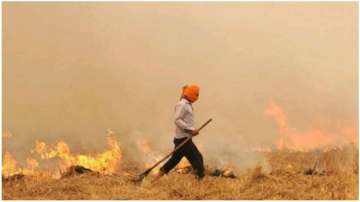Punjab has witnessed about 25 per cent jump in incidents of stubble burning, while its neighbouring state of Haryana has seen a marginal drop in farm fires so far in the paddy harvesting season.
With farmers in the agrarian states continuing to set paddy residue afire despite a ban on this practice, many have been slapped with fines and others booked for stubble burning.
However, officials of agriculture and pollution control departments are hopeful of a decrease in the number of paddy burning incidents this season.
Government agency SAFAR said the share of stubble burning from Punjab and Haryana in Delhi's pollution rose to 46 per cent on Friday.
Punjab has reported a total of 22,137 cases of stubble burning so far, with Tarn Taran district recording 2,614 incidents, an official of the Punjab Pollution Control Board said on Friday.
Ferozepur, Patiala and Sangrur reported more than 2,000 incidents each up to October 31, official said.
As per the latest data, six districts — Amritsar, Bathinda, Gurdaspur, Kapurthala, Mansa and Muktsar — reported more than 1,000 cases of stubble burning each.
Pathankot reported only two incidents of stubble burning and was the only district where the reported cases were less than ten.
Last year, the state had seen a total of 17,646 farm fire cases up to October 31, an official said.
An official of the Punjab Agriculture Department ascribed the rise in number of these cases to early maturity of crop as crop sowing was advanced to June 13 from June 20.
Haryana has witnessed 4,288 cases of stubble burning, a bit lower than what it had seen last year, official of Haryana Pollution control board said here.
There were a total of 4,589 cases of stubble burning in the state up to October 31, 2018, the official said.
A total of 324 complaints have been lodged with the police against farmers for stubble burning, an official of Haryana Agriculture Department said.
The problem of stubble burning was severe in Fatehabad, Sirsa and Kurukshetra.
In Punjab, a fine of Rs 43 lakh was imposed on farmers for defying the ban on stubble burning and fine of Rs 52 lakh was levied on 26 combine harvester operators for not installing super straw management system (SMS).
The super SMS, which is attached to the combine harvester, cuts paddy straw into small pieces and spreads it on the field. As a result, farmers are not required to burn the straw before the sowing of the next crop.
Every year, Punjab and Haryana are blamed for the rising air pollution and smog due to stubble burning by farmers. Punjab alone generates 20 million tonne of paddy stubble annually.
Delhi Chief Minister Arvind Kejriwal has blamed stubble-burning in Punjab and Haryana for the air pollution.
With farmers being encouraged to opt for farm mechanization to check stubble burning, farmers' outfits in Punjab have been demanding Rs 100 per quintal on paddy for the management of crop residue.
Latest India News
